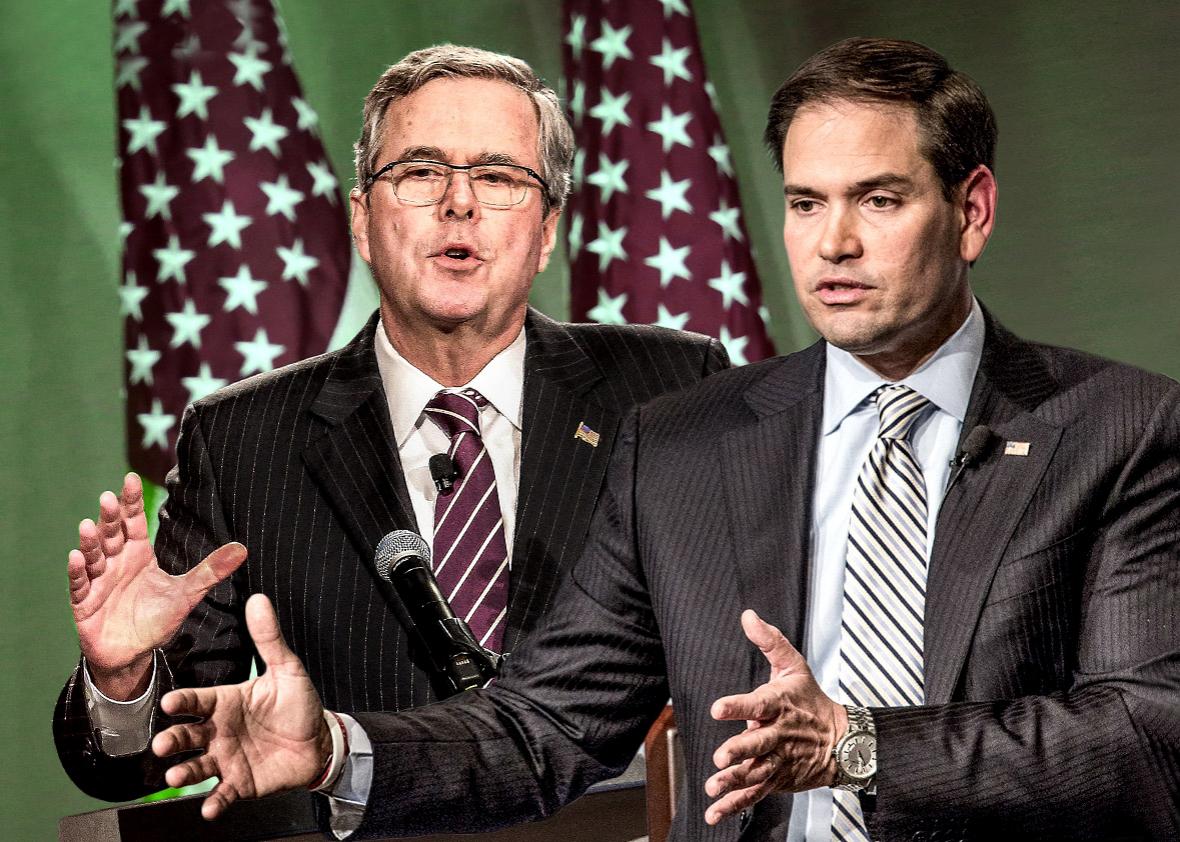The mother and the disloyal cub of the 2016 Republican presidential nomination race are at it again. Florida men Jeb Bush and Sen. Marco Rubio are effectively in the same fundraising position according to their third-quarter filings—a not-great one—but neither of them want you to focus on that.
Rubio raised about $5.7 million in the third quarter to Bush’s $13.4 million. But those sums don’t need to worry anyone. “Thanks to smart budgeting and fiscal discipline,” Rubio’s campaign announced, “Marco Rubio for President started October with more money in the bank than Jeb Bush for President and most other campaigns.” That’s kinda-sorta true. Rubio is touting $10.9 million on-hand to Bush’s $10.3. But that Rubio figure includes “about $1.2 million in general election funds” that can’t be used until he is certified as the nominee. So in terms of primary funds, Jeb Bush is the Big Winner by a few hundred grand. Fine.
That’s one weak shot from the Rubio camp. On the other side, we have Bush’s son, Jeb Jr., telling Rubio to “kind of, like, dude, you know, either drop out or do something.” (When asked about whether the senator would heed John Ellis Bush Jr.’s call to drop out of the presidential race, Rubio campaign spokesman Alex Conant had no comment.)
What’s with the lame attacks? Bush prattles on about how Rubio is young and misses votes. Rubio says that Bush is old and has marginally less cash on hand than he does, even though he doesn’t really. (It’s tickling every time Rubio’s campaign brags about how frugal it is—flying commercial, staying at mediocre hotels, etc. Pre-empting the avalanche of ads about Rubio’s fun history with credit cards, much?) These are the two lead “establishment” candidates for the Republican presidential nomination. Let’s get past the slappy nonsense and cut to the part where they accuse each other of fathering children out-of-wedlock or secretly murdering people.
What the bickering on Q3 Fundraising Release Day does achieve, though, is a mutually beneficial distraction from a larger problem: Neither of these campaigns is in particularly great shape moneywise.
The roughly $10 million that Rubio and Bush each have on hand is less than that of Sen. Ted Cruz and Ben Carson, candidates that are Not Supposed to Win. And none of the candidates’ cash-on-hand totals are anywhere near the hauls of either Hillary Clinton or Bernie Sanders ($33 million and $27 million, respectively).
More troubling is Bush and Rubio’s mutual reliance on big donors for their sums. Rubio raised 21 percent of his $5.7 million third-quarter sum from donations of $200 or less, while Bush raised a comical 7 percent of his $13.7 million from the same group. (Clinton only raised 17 percent of her sum from small donors, too, but at least she was able to shake out her wealthy cohort’s pockets for a significantly larger haul.)
Reliance on big donors, for one thing, requires a higher cost of fundraising: They like to be treated to fancy booze and only the choicest steaks in luxury homes and hotels, to which the candidate has to fly, before sending in their $2,700 checks. Small donors just go to a website. And if you rely on donors who max out early, that limits your pool of people who can continue donating as the primary goes on. (That’s one reason that Barack Obama was able to outlast Clinton in 2008. And though her competition isn’t as strong this time, Clinton risks falling into the same trap.) Maybe there’s a million-person mass that is just waiting for the right moment to dump individually modest, collectively large sums of cash into Bush and Rubio’s coffers. But maybe not?
The Republican thinking going into this race was that many core operations traditionally performed by official campaigns would be “outsourced” to super PACs. To be sure, the top GOP candidates aren’t having any trouble raising super PAC cash. But the first two dropouts, Rick Perry and Gov. Scott Walker, showed early in the process the pitfalls of leaning too much on the unlimited-fund receptacles. Both candidates’ super PACs had tens of millions of dollars in the bank when their horses quit, and their horses quit because they dried out of hard cash. In Walker’s case particularly, he assumed that his campaign fundraising would be commensurate with his super PAC fundraising, and he built a costly campaign operation based on that mistake. That left him extremely vulnerable to the whims of hard-money cash flow. When it slowed, he was finished.
Republican super PACs were supposed to have learned in the 2012 election that it’s wiser to spend more relatively on building up grassroots networks in critical states than on television ads. Well, Bush’s main super PAC, Right to Rise, has already booked $56 million worth of ad buys through the early part of next year. If Republican voters ever start liking Bush, that bombardment will help him fend off challengers in the primary. But the prioritization of ads will also leave him woefully lacking in on-the-ground organizational structure heading into a general election.
It’s no wonder that Bush and Rubio spent the latter end of this week bickering with each other about whose money pile was bigger. Because neither of them were that big, and if they’re not careful, they could find themselves in a position next year where they need cash that’s just not there.
